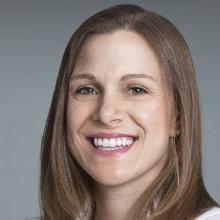- Featured institution and leadership
- What are your Accelerating Change in Medical Education project and goals?
- What are some recent accomplishments that would be of interest to others in the medical community?
- How has your work prepared you to respond to disruptions related to COVID-19?
- What do you think will change about medical education in the next five years?
- Can you share some strategies to maintain team engagement and well-being in this challenging time?
Each month, the AMA highlights institutions that are part of the AMA Accelerating Change in Medical Education Consortium to showcase their work with the consortium and innovations in medical education.
Featured institution and leadership
Abigail Ford Winkel, MD, MHPE
Associate professor; Vice chair for education, Department of Obstetrics & Gynecology; Assistant director, Institute for Innovations in Medical Education
NYU Grossman School of Medicine
Number of years in the consortium: 3 years
What are your Accelerating Change in Medical Education project and goals?
The NYU Transition to Residency Advantage program aims to improve the transition from medical school to postgraduate medical education with the support of a dedicated coaching program. Coaching has been gaining traction in medical education as a powerful tool to support professional development, goal-setting, confidence and self-directed learning—all of which are essential to a successful transition to clinical training for physicians.
Our project has trained coaches in each of the five residency programs at NYU Grossman School of Medicine: internal medicine, OBGYN, emergency medicine, orthopedics and pathology. The 134 residents in these programs met with coaches between Match Day and July 1 and have had structured meetings over the course of the year.
The goals of the project are to support these residents in developing self-directed learning skills and self-efficacy, building on their strengths and learning how to set goals that help them as they navigate residency.
What are some recent accomplishments that would be of interest to others in the medical community?
While our dedicated GME Bridge Coaches participated in an interactive nine session coaching curriculum and practiced coaching skills in a group observed coaching skills examination (GOSCE), not all faculty have the time and resources to dedicate to learning coaching skills. Faculty in the residency programs involved in the grant participated in an asynchronous coaching curriculum that is now available online.
This curriculum can be completed in small groups using independent learning and build on the experience that medical educators already have working with learners.
Navigator, a web-based platform to support coaching, has supported over a thousand meetings between learners in undergraduate and graduate medical education and their coaches, providing support for scheduling, goal-setting and professional portfolios. A revamped Navigator help system includes guides for students, residents, faculty coaches and administrators. Navigator is continuously revised with new features and enhancements based on feedback from coaches and residents.
How has your work prepared you to respond to disruptions related to COVID-19?
The participants in the NYU Transition to Residency Advantage project have been at the front lines of the COVID-19 pandemic, particularly the residents and GME educators in internal medicine and emergency medicine. We have learned flexibility as we have tried to support these teams in meeting their personal and professional goals while also providing tremendous support to our communities through their clinical work. This adaptability is a core feature of coaching, which uses past and present insights to focus on a forward-facing approach to addressing challenges. Learning from experts in the AMA Accelerating Change in Medical Education Consortium about coaching prepared us all to deploy these skills in the pandemic.
What do you think will change about medical education in the next five years?
As educational data and technology continuously expand, we imagine that medical education will become increasingly tailored to the needs of individual medical students. Precision medical education will use integrated data and AI tools to efficiently personalize medical education to individual learners and give new insights to their programs and coaches.
Can you share some strategies to maintain team engagement and well-being in this challenging time?
Throughout the pandemic, medical educators have lost an important source of inspiration and motivation: getting together with colleagues and learners, informally and formally, and having fun! While we have learned to use digital platforms in ways that will benefit us for years to come, we have missed team meals, conferences, and cups of coffee that lead to satisfaction and engagement with work. Recognizing these activities as critical work functions is important: making time for breaks, for social engagement and fun with the people who inspire us, teach us and learn from us is critical.
Those two-minute breakout sessions at the beginning of a long meeting where you just ask a friend or stranger: how are you doing? They are important! The shared strain of this time gives us a chance to gain even more from knowing each other. Taking the time to chat in the hallway with an intern who has made it through the first brutal half-year of residency, even if was not as fun in an N95 mask and an eye shield, brought me joy and reminded me why we all do this work. Recovering from work-related stress and setting boundaries are important, but engaging in what we do because we love it is critical.




